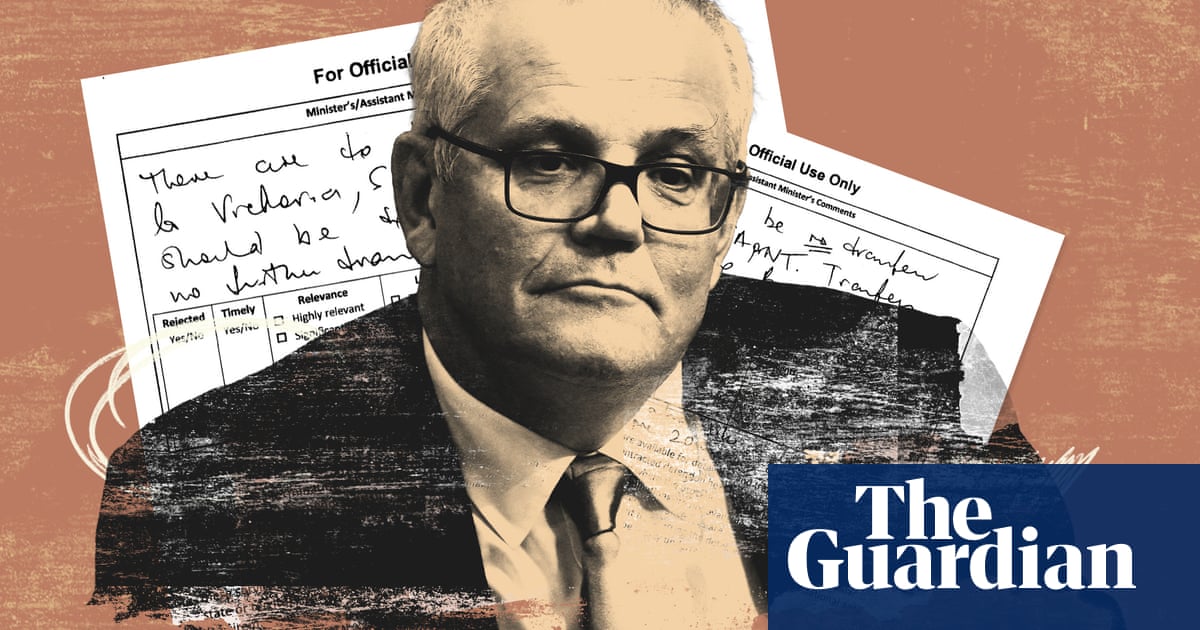Scott Morrison overrode medical advice in the case of an asylum seeker in offshore detention trying to access an abortion, and had previously sought advice that would effectively prevent access to terminations entirely, ministerial advicereveals.
Documents released under freedom of information laws show Morrison, in 2014 as immigration minister, had sought advice to deny the transfer of women to a hospital on the Australian mainland to access termination services before 20 weeks’ gestation.
Abortion is illegal on Nauru, except to save the mother’s life, and carries a prison term of up to 14 years. Termination laws differ across Australian states, but if pregnant women in offshore detention were prohibited from accessing abortion services in Australia until after 20 weeks, it would be far more difficult to access those services at all.
A handwritten note by Morrison, on a document dated June 2014, stated: “I would also like advice on denying transfer pre 20 weeks for pregnant women.” In the same document, Morrison specified that women should only be transferred to Brisbane, not South Australia, the Northern Territory or Victoria for abortion services.
Morrison did not respond to requests for comment, and Guardian Australia cannot confirm what advice he received.
In the case of a woman, who was not identified in the redacted documents, medical advice recommended she be transferred to Victoria for an abortion, over Brisbane where she would have had to have waited a week for a hospital ethics panel to consider her case. That policy was in place in Queensland for women seeking a termination after 20 weeks’ gestation. In Victoria, a woman could seek a termination without approval of a hospital ethics board until 24 weeks.
Guardian Australia understands the woman was taken to Brisbane, rather than Melbourne, where the panel deliberated on her case.
One senior source, who spoke to Guardian Australia on the condition of anonymity, said Morrison did not specifically target abortion access.
Sign up for Guardian Australia’s breaking news email
David Manne, a prominent refugee advocate and lawyer, said in his view the broader immigration policy at the time was part of an “extreme deterrence agenda”.
“Inherent in the [broader] policy was conscious, calculated cruelty,” he said. “Clearly, [the policy] was far more than reckless indifference, it was deliberate.
“[It was] part of a system that was underpinned by the extreme deterrence agenda … the basic rights and dignity of people subject to the policy were essentially irrelevant.”
Jana Favero, the deputy CEO of the Asylum Seeker Resource Centre (ASRC), who was an advocate for the centre at the time, said the documents were “outrageous” and “consistent” with the ASRC’s experience trying to help asylum seekers get medical transfers.
“It was extremely challenging and difficult for the medical transfer from people offshore, in particular women who were pregnant,” she said.
Manne claimed the Abbott government was concerned asylum seekers and refugees were using medical transfers as a back door to get into Australia.
Once in Australia, and in the Australian onshore detention system, an asylum seeker could go to the court to seek an injunction to prevent being sent back to offshore detention.
“[They] could plead their case under law to resist being sent back toNauru, to further dangers of the kinds that they’d already faced,” Manne said.
This wasn’t the only concern held by the government. Manne said the policy was based on deterrence, to stop others seeking asylumarriving by boat.
“If we make some exception, if there’s a perceived crack of light in this policy, this could see the resumption of boat arrivals, that was clearly the thinking.”
Later, in 2019, Peter Dutton, by then the home affairs minister in the Morrison government,accused women in Nauru refugee centresof using rape and abortion claims as a ploy to get to Australia.
Over the 18 months from 1 January 2013 to 20 June 2014,IHMS, the government contracted healthcare provider for Nauru, said there were six pregnant transferees who were taken to the mainland for a termination. In June 2014, there were 289 women in detention on Nauru, according to data collated by the Refugee Council of Australia.
Numerousinternal and external reviewsof offshore detention centres found instances of violence and traumatic living conditions, amid allegations and reports of rape, sexual assaults.
An independent investigation, by the former integrity commissioner Philip Moss, commissioned by Morrison in October 2014, found evidence of rapes and sexual violence on Nauru and Manus Island, and said incidents were often under-reported.
In 2016, Guardian Australia released theNauru files, a collection of 2,000 leaked incident reports detailing harrowing instances of abuse on the island between May 2013 and October 2015. More than half of the reports (51.3%) involved children, even though children made up only about 18% of those in detention on Nauru during the time covered by the reports.
Favero said the ASRC had performed its own audit on medical transfers at the time, and said it sometimes took up to 18 months for an asylum seeker to get help on the mainland.
“From the point where there was a [doctor’s] recommendation for a medical transfer, sometimes it took up to 12 to 18 months for that to happen, and it only happened as a result of a huge amount of pressure including legal action,” Favero said.
In February 2019, five years later, after Morrison became prime minister, Labor and the crossbenchpassed the medevac bill, against the Coalition government, that established a medical panel to oversee medical transfers of people from offshore detention.
That law lasted less than 10 months, before it wasrepealedby the Morrison government in December that year.
“The decision [to transfer a patient] should have been in doctors’ hands not in bureaucrats and politicians hands which is what that legislation was,” Favero said.
